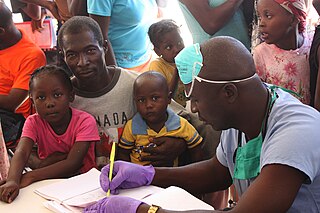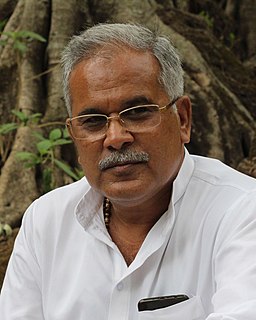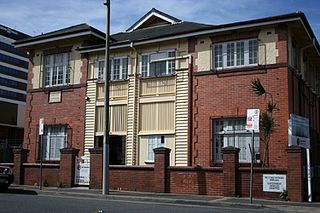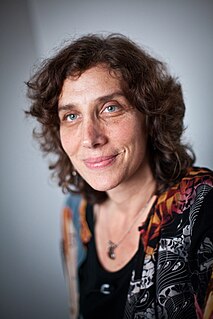Related Research Articles

Barefoot doctors were healthcare providers who underwent basic medical training and worked in rural villages in China. They included farmers, folk healers, rural healthcare providers, and recent middle or secondary school graduates who received minimal basic medical and paramedical education. Their purpose was to bring healthcare to rural areas where urban-trained doctors would not settle. They promoted basic hygiene, preventive healthcare, and family planning and treated common illnesses. The name comes from southern farmers, who would often work barefoot in the rice paddies, and simultaneously worked as medical practitioners.

Partners In Health (PIH) is a Boston-based nonprofit health care organization founded in 1987 by Paul Farmer, Ophelia Dahl, Thomas J. White, Todd McCormack, and Jim Yong Kim.

The organization SEKEM was founded in 1977 by the Egyptian pharmacologist and social entrepreneur Dr. Ibrahim Abouleish in order to bring about cultural renewal in Egypt on a sustainable basis. Located northeast of Cairo, the organization now includes:

Dhulikhel Hospital, a Kathmandu University hospital, is an independent, not for profit, non-government hospital in Dhulikhel, Kavrepalanchok, Nepal.

Bhupesh Baghel is an Indian politician serving as the third and current Chief Minister of Chhattisgarh. He was president of Chhattisgarh Pradesh Congress. He has been member of legislative assembly five times from Patan. He had been cabinet minister in undivided Madhya Pradesh in Digvijaya Singh government in late nineties. He was first Minister for Revenue, Public Health Engineering and Relief Work of Chhattisgarh.
Sudan is still one of the largest countries in Africa even after the split of the Northern and Southern parts. It is one of the most densely populated countries in the region and is home to over 37.9 million people.
Vietnam is currently striving towards a universal health care system. At the end of 2014, 71.6% of the population had health insurance. Currently, the government subsidizes 80% of hospital fees for the poor and near-poor, as well as 100% for poor people and ethnic minorities living in disadvantaged areas, and 30% for farmers and fishermen who have average living conditions.

Abhay Bang and Rani Bang are Indian social activists and researchers working in the field of community health in the Gadchiroli district of Maharashtra, India. They have revolutionized healthcare for the poorest people in India and have overseen a programme that has substantially reduced infant mortality rates in one of the most poverty-stricken areas in the world. The World Health Organization (WHO) and UNICEF have endorsed their approach to treating newborn babies and the programme is currently being rolled out across India and in parts of Africa. Abhay and Rani Bang founded the Society For Education, Action and Research in Community Health (SEARCH) – a non-profit organisation, which is involved in rural health service and research. The couple is the winner of the Maharashtra Bhushan Award. Sanjay Gandhi Postgraduate Institute of Medical Sciences, Lucknow has conferred honorary doctorates on Abhay and Rani Bang. SNDT Women's University, Mumbai has also awarded honoris causa to Rani Bang. The Lancet has honoured the couple as "the pioneers of health care in rural India". Abhay and Rani Bang are the first recipients of the Distinguished Alumni Award from the Department of International Health at the Johns Hopkins Bloomberg School of Public Health. They were also inducted into the Johns Hopkins Society of Scholars. The Bangs are honoured for their leadership in community-based health care that is now helping to save the lives of millions of the most vulnerable newborns and children. During their careers, the Bangs have helped foster a renaissance in community-based primary health care. In 2016, Johns Hopkins University conferred the Distinguished Alumni Award upon them.
The Republic of Moldova has a universal health care system.

The Comprehensive Rural Health Project (CRHP) is a non profit, non-governmental organization located in Jamkhed, Ahmednagar District in the state of Maharashtra, India. The organization works with rural communities to provide community-based primary healthcare and improve the general standard of living through a variety of community-led development programs, including Women's Self-Help Groups, Farmers' Clubs, Adolescent Programs and Sanitation and Watershed Development Programs. CRHP was founded in 1970 by Drs. Raj and Mabelle Arole, who conceived the organization's model while on a Fulbright Scholarship at Johns Hopkins University. The work of CRHP has been recognized by the WHO and UNICEF, as well as being introduced to 178 countries across the world.
The public healthcare system in India evolved due to a number of influences since 1947, including British influence from the colonial period. The need for an efficient and effective public health system in India is large. Public health system across nations is a conglomeration of all organized activities that prevent disease, prolong life and promote health and efficiency of its people. Indian healthcare system has been historically dominated by provisioning of medical care and neglected public health. 11.9% of all maternal deaths and 18% of all infant mortality in the world occurs in India, ranking it the highest in the world. 36.6 out of 1000 children are dead by the time they reach the age of 5. 62% of children are immunized. Communicable disease is the cause of death for 53% of all deaths in India.

The Institute for Indian Mother and Child (IIMC) is a non-governmental organization with its main office in Calcutta, India. In 1989 the Indian physician Dr. S. K. Brahmochary founded the IIMC with the aim to improve the living conditions of the poorest in Calcutta and its surroundings on a long-term basis. The issues of mother and child welfare as well as woman empowerment are of central importance.
Adani Foundation is an Indian non-profit organization which was founded in 1996 by Gautam Adani. It is wholly owned by Adani Group. It is considered one of the major corporate-funded foundations operating in India.

Fortitude Valley Child Health Centre is a heritage-listed clinic at 112 Alfred Street, Fortitude Valley, Queensland, Australia. It was designed by Cecil James Virgo. It is also known as Fortitude Valley Baby Clinic & Nurse Training Centre. It was added to the Queensland Heritage Register on 12 August 2011.

SAI Sanctuary is located in the Kodagu district in the Indian state of Karnataka. SAI Sanctuary is the only private sanctuary in India. It is spread over an area of 1.2 square km. It is managed by SAI Sanctuary Trust. SAI Sanctuary trust won the Wildlife and Tourism Initiative of the Year Award-2014 for Eco-Tourism that protects forests and wildlife.
Margaret Charles Smith was an African-American midwife, who became known for her extraordinary skill over a long career, spanning over thirty years. Despite working primarily in rural areas with women who were often in poor health, she lost very few of the more than 3000 babies she delivered, and none of the mothers in childbirth. In 1949, she became one of the first official midwives in Green County, Alabama, and she was still practicing in 1976, when the state passed a law outlawing traditional midwifery. In the 1990s, she cowrote a book about her career, Listen to Me Good: The Life Story of an Alabama Midwife, and in 2010 she was inducted into the Alabama Women's Hall of Fame.

Dr. Abayomi Ajayi is a Nigerian obstetrician/gynecologist.

Laura Stachel is a former medical doctor who founded and leads We Care Solar, a nonprofit that manufactures solar electric systems the size of a suitcase for use in medical clinics in the developing world. She is also the mother of actor and singer Ari'el Stachel.
Akshayakalpa is the first Certified Organic Milk Brand in India. Headquartered in Tiptur, Karnataka, the company manufactures, markets, and sells Organic Milk and Milk products. In September 2020,the organisation was rated as among top organic dairy in India which is providing 100% pure cow’s milk.
Ravindra Kolhe and Smita Kolhe are Indian social activists and doctors working for tribal people in remote village areas of Bairagarh in Melghat region of Amravati district in Maharashtra. Ravindra Kolhe completed his MBBS in 1985 and MD in 1987 from Government Medical College, Nagpur. He has been actively working in Bairagarh area since 1985. He married Smita, also a doctor specializing in Ayurveda and Homeopathy, and together continued their work. They charged a nominal fee of ₹1 (1.3¢ US) for treatment and also run a Government ration shop. Apart from medicinal help, the couple also makes general awareness campaigns for the tribals. The works of Kolhe couple has resulted in reduction of infant mortality rate from 200 per 1000 to 40 and pre-school mortality rate from 400 per 1000 to 100. In 2019, the couple received Padma Shri, India's fourth highest civilian award.
References
- 1 2 3 4 5 6 7 8 9 10 11 12 13 14 15 16 17 18 19 20 Manu, Meera (9 April 2018). "A couple in love, with service". Deccan Chronicle. Retrieved 9 March 2021.
- ↑ Tribal Health Initiative website. Available at http://www.tribalhealth.org [Accessed on 18 March 2010]
- 1 2 3 4 5 6 7 8 9 10 11 12 13 14 15 16 17 18 19 20 21 22 23 24 25 26 27 "Tribal Health Initiative: Holistic Tribal Healing in Real Life". BORGEN. 18 May 2017. Retrieved 9 March 2021.
- 1 2 "This doctor couple has been healing the tribal folk of Sittilingi in TN for over 2 decades". The New Indian Express. Retrieved 19 January 2019.
- ↑ Sivanand M. (2001) The Good Doctors of Sittilingi Reader's Digest September 2001 issue